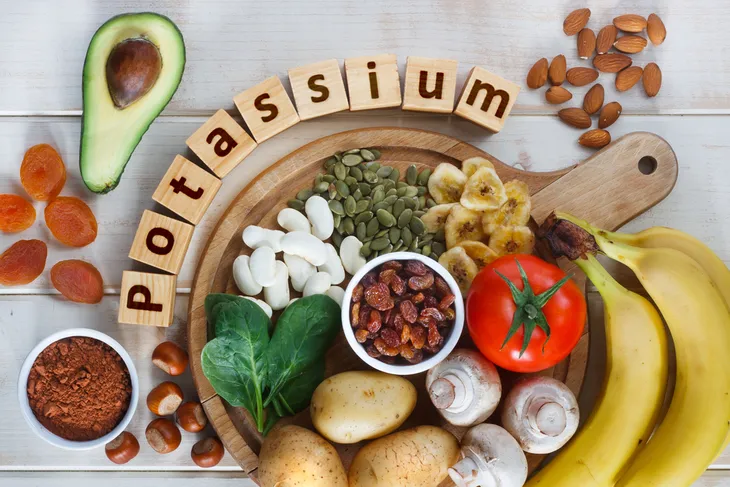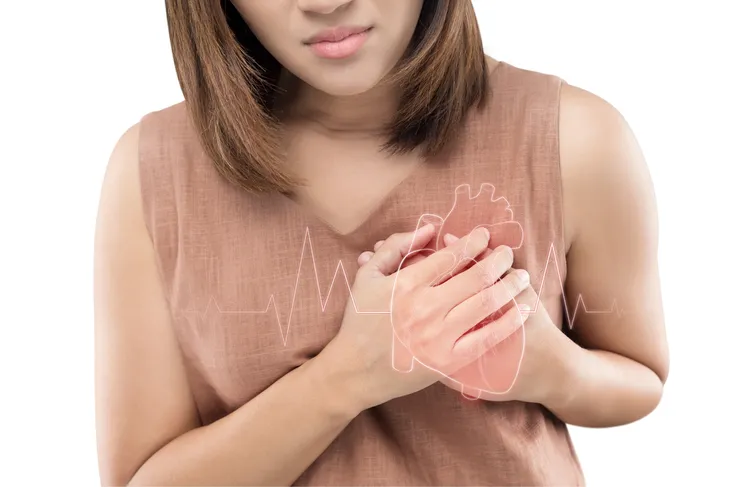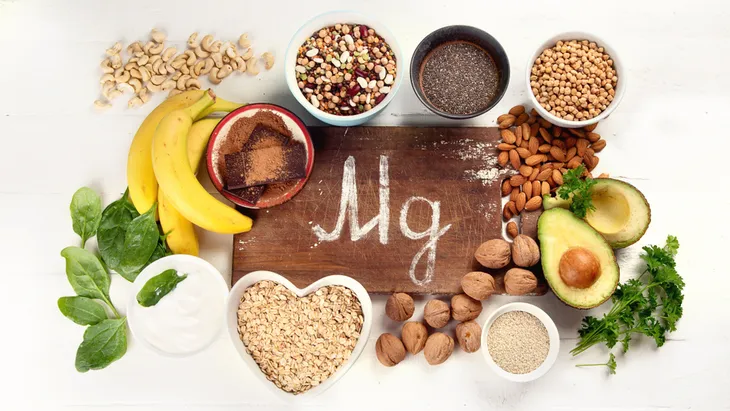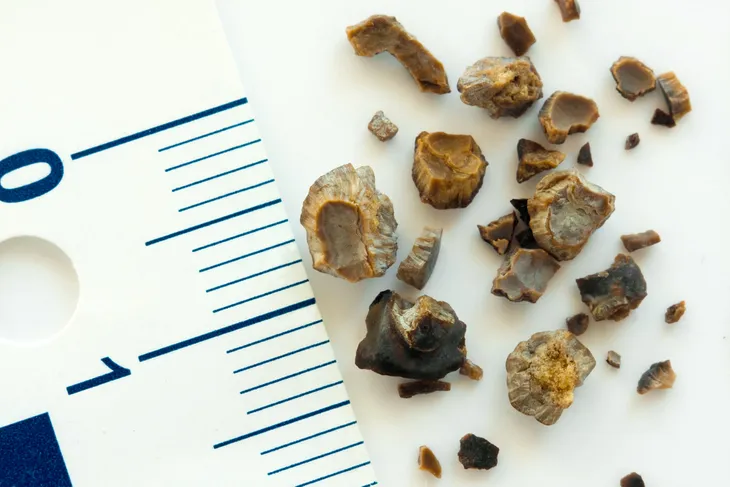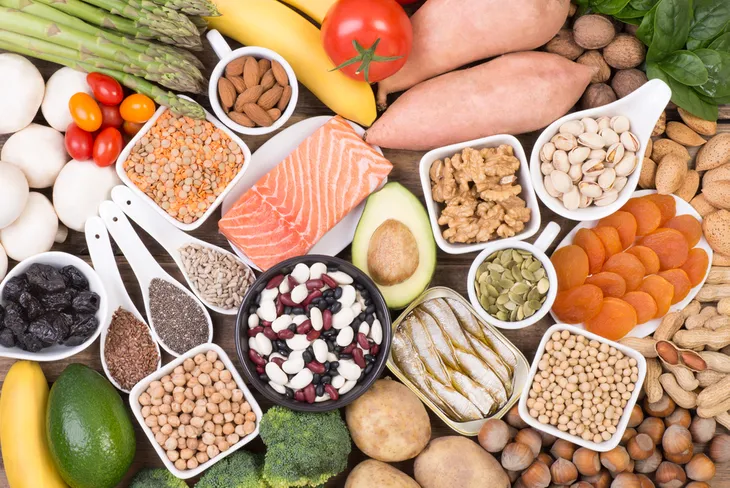When it comes to vitamin deficiencies, low potassium is not something that often comes to mind over the D’s, C’s and B’s. However, this vitamin is responsible for muscle function, fluid regulation, and several other vital body functions. Other than the odd Charley horse, how can you know if you’re potassium stores are low?
Obviously, keeping potassium levels up goes farther than eating a banana. In fact, you can also get a good serving of the vitamin in an avocado or a baked potato (with skin) as well as with a handful of spinach, Swiss chard, broccoli, or a bowl of strawberries. Here are 14 common indicators of low potassium…
Want diet & nutrition content delivered straight to your inbox? Sign up for our exclusive diet & nutrition newsletter!
1. How Much is Enough Potassium?
According to U.S. Dietary Guidelines, North American adults are hardly reaching the daily recommended amount of 4,700-milligrams of potassium daily. This is especially concerning, considering a study from the Clinical Journal of the American Society of Nephrology that linked potassium to the ability to ward off kidney and heart disease.
Statistics from the Institute of Medicine found that most of us are getting about 50-percent of the recommended daily allotment for potassium. Even more troubling is the fact that potassium deficiency can’t be detected via routine testing.
2. Muscle Cramps
Do you find that you’re experiencing muscle cramps more often than usual? It could be due to low potassium levels. Prevention explains that muscle spasms in the legs that occur frequently and often during a workout could be due to not consuming enough potassium. This happens because when our body is expelling energy, such as during a workout, it’s also using up electrolytes.
“For athletes, a lack of potassium can lead to muscular complications, including problems contracting and reduced blood flow, which can lead to dangerous rhabdomyolysis,” says Ginger Hultin, MS, RDN, CSO, spokesperson for the Academy of Nutrition and Dietetics when talking to Prevention. Rhabdomyolysis is a serious condition where muscle tissue breaks down at a rapid rate. “Low potassium in athletes can lead to muscle weakness, fatigue, and cramping.”
To combat these muscle cramps, Prevention recommends drinking some kind of sports drink that contains lots of electrolytes. Typically, we suggest drinking water, but in this case, electrolytes are important.
3. You Have No Energy
Unexplained fatigue, muscle weakness, and an all-around sluggish feeling could indicate low potassium stores. If you’ve been sleeping plenty but still wake up with zero energy, you should talk to your doctor about vitamin deficiencies.
Thankfully, potassium levels can be brought back up to balance by eating a good variety of potassium-rich fruits and veggies. Look to broccoli, spinach, Swiss chard, and potatoes with the skins intact to zap that blah feeling.
4. Irregular Heartbeat
If your heart regularly skips a beat…or two or three…it could be a result of heart palpitations, which are due to low potassium stores. For most folks, heart flutters, throbs, a racing heart, or a beat that skips can occur now and then without concern. But Prevention points out that a potassium deficiency, even a moderate one, could cause cardiac arrhythmias (or an abnormal heartbeat), especially for people who are at risk of heart disease.
According to a study published in the journal Experimental & Clinical Cardiology, seven to 17-percent of patients who suffer from cardiovascular disease, also suffer from hypokalemia (potassium deficiency). “This is due to its impact on muscle contractions, and therefore, heart function,” writes Prevention.
5. High Blood Pressure
High blood pressure can be caused by excess weight, it can be hereditary, or it can be linked to the consumption of excess sodium. “Potassium and sodium have a balance in the body. There is some evidence that if sodium levels are too high and potassium levels are too low, this can play a role in elevated blood pressure, which can lead to stroke,” says Ginger Hultin, MS, RDN, CSO, spokesperson for the Academy of Nutrition and Dietetics, to Prevention.
To better understand their relationship, Prevention says to think of potassium and sodium as sidekicks. When there’s too much sodium in the body, our blood vessels get stressed out. We are able to manage the effects of excess sodium by eating potassium-rich foods. “The more potassium you eat, the more sodium you lose through urine. Potassium also helps to ease tension in your blood vessel walls, which helps further lower blood pressure,” writes the American Heart Association.
6. Your Diet Lacks Fruit and Veggies
If you’ve gleaned anything from this article, consider that diets high in fruits and veggies will ensure adequate potassium. In fact, guidelines from the U.S. Department of Agriculture indicate that the brighter and more various the colors—the better!
After all, a meal that’s largely monochromatic suggests mostly starch and meat, while a rainbow plate suggests a healthy, balanced, amd antioxidant, vitamin-rich diet.
7. Low in Magnesium
A diet that lacks in one nutrient, probably lacks in another too! All the essential nutrients are needed for our body to function at its best, this is why they are considered essential. Prevention points out that when a person is deficient in one, they can easily become deficient in another. The National Institutes of Health (NIH) points out that 50-percent of people who have a potassium deficiency will have a magnesium deficiency too.
“Magnesium a mineral that is involved with hundreds of chemical reactions in your body — actively transports potassium across your cells,” writes the source. It’s for this reason that when a person is deficient in magnesium, they’re likely deficient in potassium too. To boost magnesium levels, try eating foods such as spinach, nuts, soy milk, black beans, avocado, and peanut butter.
8. Kidney Stones
Kidney stones are masses that form inside the kidneys that can range in size but are often quite painful. The pain becomes extreme as the body has to pass these deposits out of the body through the urine. As long as they are caught early, they usually don’t do too much damage.
Prevention refers to a study published in the Annals of Internal Medicine, which examined a group of over 90,000 women aged 34 to 59. These women had no history of kidney stones, but after 12 years of examination, it was found that those who consumed more than 4,0999-milligrams of potassium daily were able to lower their risk of kidney stones by 35-percent compared to those who ate less than 2,407-milligrams of potassium daily.
These masses are made up of minerals, but the most common type of kidney stone are built of calcium. So, what does this have to do with potassium? Prevention explains, ” […] Because potassium helps your kidneys flush excess calcium through your urine, not getting enough of it can cause these masses to develop.”
9. Weak and Tired
We all feel tired from time to time. Usually it’s because we’re feeling a little worn down from a busy schedule or lack of sleep, but in some cases, it’s a result of something else. While there are many health-related conditions that can cause an overwhelming feeling of fatigue, low potassium is one of them. So, if you’ve been getting lots of sleep and rest, but still feel weak and sluggish, it might be time to look at your diet and whether or not you’re getting enough potassium.
“Eating more potassium-rich fruits and vegetables may make you feel more vital,” says Angela Lemond, RDN, CSP, LD, a spokesperson for the Academy of Nutrition and Dietetics when talking to Prevention. Since potassium is a vital and essential nutrient that our body relies on to perform and function properly, a deficiency could cause our body to feel more worn down.
10. Digestive Problems
Digestive problems can occur for a number of different reasons, one of which is a potassium deficiency. “Potassium helps relay signals from the brain to muscles located in the digestive system. These signals stimulate contractions that help the digestive system churn and propel food so it can be digested,” writes Healthline. Thus, when the body isn’t receiving enough potassium, it cannot relay signals as well and the digestive system isn’t working as effectively as it should be, which creates problems.
“Contractions in the digestive system may become weaker and slow the movement of food. This may cause digestive problems like bloating and constipation,” explains the source.
11. Mood Changes
Just like fatigue, mood changes are something we all experience from time to time. Some days we’re a little peppier than others and that can be due to a number of different factors. One of the reasons a person may be experiencing mood changes and mental fatigue is because their potassium levels are low. “Low blood potassium levels may disrupt the signals that help maintain optimal brain function,” writes Healthline.
The source then goes on to cite a study which found that 20-percent of patients with mental disorders also have a potassium deficiency. However, it’s important to note that there isn’t much evidence to support the link between potassium and mood disorders. There needs to be a lot more research done in order to make any definitive findings.
12. Tingling and Numbness
Anyone who experiences tingling and numbness would be rather alarmed, particularly if it doesn’t go away. If this is the case, it’s commonly referred to as paresthesia, which typically occurs in the hands, arms, legs, and feet.
“Potassium is important for healthy nerve function. Low blood levels of potassium can weaken nerve signals, which may result in tingling and numbness,” writes Healthline. These types of symptoms are nothing to be too concerned about if they happen once in a while, but if they persist over a long period of time, it could be a sign of something more severe. If you’re experiencing signs of paresthesia, seek attention from a medical professional.
13. Breathing Difficulties
If the deficiency has become severe, it can impact how a person is able to breathe. “This is because potassium helps relay signals that stimulate the lungs to contract and expand,” writes Healthline. If potassium levels ever become low enough it will impact the lungs and whether or not they are able to expand properly. This causes a feeling of shortness of breath.
Low potassium can also create breathing difficulties if the heart is beating abnormally (we discussed this in more detail back in slide 4). An irregular heartbeat occurs when there is less blood pumped from the heart to the rest of the body. “Blood delivers oxygen to the body, so an altered blood flow may cause shortness of breath,” notes the source.
In especially severe cases, Healthline warns that extremely low potassium levels could even stop the lungs from working entirely creating fatal consequences.
14. How to Get More Potassium
Now that we’ve talked about all the warning signs of low potassium and even how much potassium a person needs on a daily basis, let’s get into how we get potassium into our diet. The best way is to load up on fruits and vegetables. The Centers for Disease Control and Prevention recommends adults consume around 4,700-milligrams of potassium daily. This can be achieved by eating 1.5 to 2-cups of fruit a day and 2 to 3-cups of vegetables a day. Unfortunately, around 1 in 10 adults are not meeting this requirements, which puts them at risk for a deficiency.
Prevention provides a nice list of foods to consume in order to keep potassium levels high (and they aren’t all fruits and vegetables). You can find potassium in foods like pumpkins, potatoes, eggplant, avocado, tomatoes, cucumbers, zucchini, leafy greens, carrots, raisins, beans, dairy products like milk and yogurt, poultry, meat, fish, and nuts.
If diet doesn’t work, you could try supplements, but they should be prescribed by a doctor first. “Supplements may be prescribed by a doctor if someone has a medical condition or is on certain medications. Keep in mind that supplementing on your own with potassium can actually be dangerous and cause problems with heart rhythm or even cardiac arrest, so always work with your doctor if you have questions about getting more in pill form,” says Ginger Hultin, MS, RDN, CSO, spokesperson for the Academy of Nutrition and Dietetics to Prevention.

